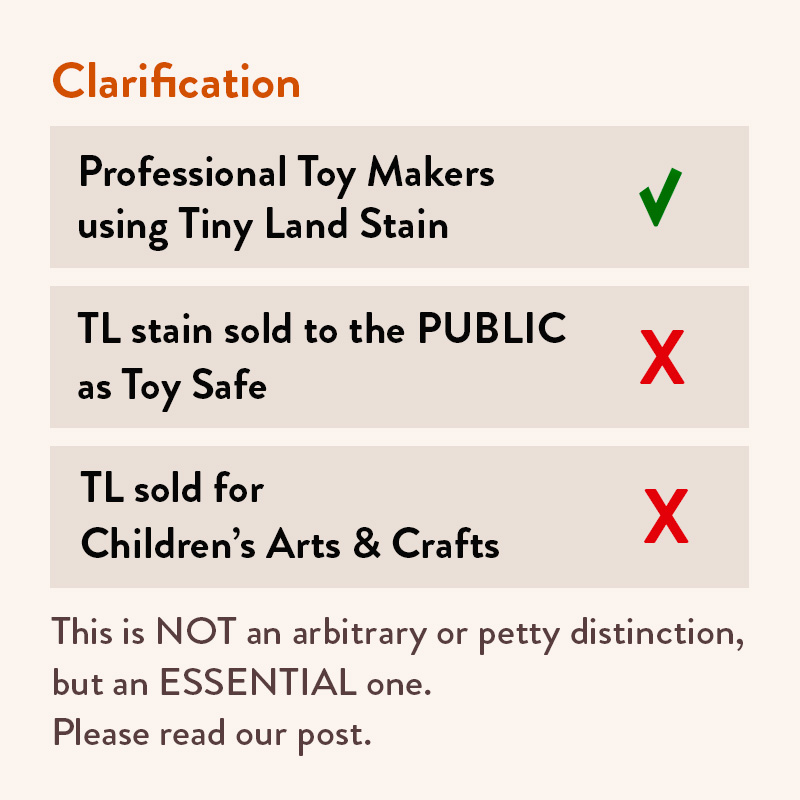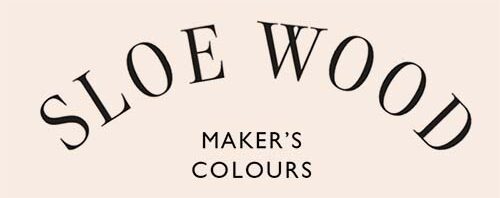Clarification For Parents and Toy Makers

For Parents and Toy Makers
Firstly, sorry for causing any stress.
We published our first post on our own social and sent emails to a handful of relevant customers. We expected to reach about 10 people who’d actually look at it and receive a few email with questions.
We received a few DMs from toy makers who wanted us to clarify. We explained that as they’re professionals who know how to apply the top coat accordingly, there’s no problem continuing to use the TL stain.
We’ve learnt the post was shared on a large group feed and caused much stress for many – we had not expected this. Because of my long, wordy post, there was much confusion and misunderstanding.
My post was a bit of a ‘dissertation’, so I’m going to clarify things with a simple graphic (above) and example scenarios.
I’ve heard arguments that a limited amount of food colouring here and there for most kids is not a big deal. I don’t disagree with this. I’ve eaten tons as a kid with a sweet tooth, and have no health issues.
The point is that, for a company to claim certain product safety, it has to consider ALL members of the public and scenarios. i.e. Inclusive of the most vulnerable ones.
This is NOT about you and your child (not saying this in a funny way).
There is a hypothetical child of someone else down the road, who happens to love art, spends much time playing with these dyes, dipping her hands, staining her body, licking it, daily, over years, while doing her painting and decorating things with it.
There is the possibility that this child has a compromised immune system and develops health issues. The parents look into it and have a suspicion that the long and excessive exposure to these food colourings through her daily art activity is the cause, and her health issue is linked to known dangers.
When that scenario happens, Tiny Land, as manufacturer, will be entirely liable. Not us, who are just resellers.
The parents were told this was completely safe, nothing to worry about, and even safe to eat. They trusted these claims. With hundreds of known research papers on the health risks linked to these dyes, there will be grounds for them to sue Tiny Land.
This is the same for the ‘Toy Safe’ claim.
This is not about YOU, professional toy makers who know what you’re doing and do your due diligence. The issue is with the claim ‘toy safe’ when it’s sold to all members of the PUBLIC.
Another hypothetical scenario.
A loving grandmother buys the stain and makes colourful blocks for her grandchild. She may not seal it at all, or add some walnut oil, let’s say. She’s never made a toy before, but when she saw this ‘toy safe’ product, she decided to make some for her grandchildren.
This particular grandmother does NOT have the knowledge and resources that a TOYMAKER (you) has, to finish the toy safely.
Her young grandchild sucks on it, the dye leaches out and it happens the child is allergic to one of the colourants, so she has a bad reaction. The grandmother trusted that these are ‘toy safe’ dyes and received no warning from the manufacturer regarding any allergy.
In this scenario, Tiny Land can also be sued for all damages, regardless of the fact that it did meet EN71-3. NOT us.
There are autistic children, children who are especially sensitive, immune compromised, parents with mental challenges, elderly customers etc etc.
When you sell to a member of the public, you have to consider EVERYBODY.
When we say these are not ‘Safe for Children’ and cannot be sold as ‘Toy Safe’ to the public, we’re not saying that YOUR kids can’t tolerate some food colourings or that YOU can’t use them responsibly as a toymaker.
We know that your child will never be drinking these dyes from the bottle. But I know of autistic children who will, if you happen to take your eye off them for a second. They may be with elderly grandparents, who thought these were totally safe and good for them. These things happen.
A company should never sell products as these TL products are sold now with blanket safety claims and no warnings.
Lastly, certain azo dyes are NOT permitted to be used in children’s crafts and finger paints in the first place. Other fully compliant products will not expose your children to these compounds.
Whereas Tiny Land products are made of azo dyes and not tested for EN71-9 (the category for finger paint etc.) (see more here: https://sloewood.com/2024/02/10/safe-for-kids/ )
And if you’re in the US, there are colourings from the UK that are banned in the US, so your children won’t even be eating them ever. Whereas if you used Tiny Land playdough and kids sometimes eat it, they will actually be eating compounds banned for any food in the US.
Anyhow…
We have a lot of this inventory, if we continue to sell these as ‘Safe for Children’ and ‘Toy Safe’ to the public, the risk of any of the above scenarios will increase where Tiny Land will be ENTIRELY liable. It’s not our risk.
And we’ll sell our remaining stock even slower, because when we can’t make these claims, it limits the customers. so we’re not gaining anything here.
TL said we’re doing this to benefit our new launch. The thing is, we happened to look into this because of our recent product development… What are we supposed to do? Not tell our customers?
Please understand that companies MUST make a public announcement whenever a new health risk or incorrect claims are discovered regarding the product they’re selling.
It’s not our job to advise TL for their safety assessment or compliance. We’re saying WE will not sell them as Toy Safe to the public, because we think it can do harm.
For those who tell us to mind our own business, we’re minding our business, this is the product we bought based on these claims and have been selling to our customers based on these claims
TL is free to take their own risks.
…………
I hope all distinctions are clear, in summary:
- Professional TOYMAKERS can use TL or other EN71 tints to make their toys and finish them safely using their OWN knowledge and resources that are often NOT available to the PUBLIC.
- selling the STAIN as ‘Toy Safe’ to any member of PUBLIC is an entirely different matter.
One last word: there are EN71-3 tints/colourants that do not have any known allergy associations. Whereas food colourings frequently have. (Even those are NOT sold to the public as ‘toy safe’. See more here: https://sloewood.com/2024/02/10/3-toy-safe/ )
This information should be useful to toymakers and be part of their safety assessments.
THE END
